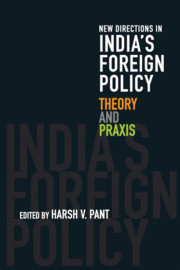Book contents
- Frontmatter
- Contents
- Preface
- 1 Introduction
- Part I Theoretical Evolution
- Part II Emerging Themes
- 7 Non-Alignment and Beyond
- 8 India and Multilateralism: Concepts, New Trajectories and Theorizing
- 9 India and the Responsibility to Protect
- 10 India and the Indo-Pacific Discourse
- 11 India and Nuclear Deterrence
- 12 India and Its Diaspora
- Bibliography
- Contributors
- Index
11 - India and Nuclear Deterrence
from Part II - Emerging Themes
Published online by Cambridge University Press: 13 November 2018
- Frontmatter
- Contents
- Preface
- 1 Introduction
- Part I Theoretical Evolution
- Part II Emerging Themes
- 7 Non-Alignment and Beyond
- 8 India and Multilateralism: Concepts, New Trajectories and Theorizing
- 9 India and the Responsibility to Protect
- 10 India and the Indo-Pacific Discourse
- 11 India and Nuclear Deterrence
- 12 India and Its Diaspora
- Bibliography
- Contributors
- Index
Summary
Nuclear deterrence has been a formal component of India's defence strategy for the past two decades. The public debate, as well as the specialist literature on the subject, has been, unexceptionably and predominantly, concerned with two questions: First, what are the requirements of deterrence or, if put in another way, how much is enough? And second, how can a stable strategic environment be best maintained under the shadow of nuclear weapons? Not much scholarly effort has been devoted to historically rooted theoretical analysis that might clarify some of the difficult problems facing Indian deterrence strategy. This chapter will attempt to do so.
The Indian experience has been uneven with regard to these questions. First, notwithstanding the adoption of a doctrine of ‘minimum credible deterrence,’ it is not at all clear what ‘minimum’ means, and critics have argued that the Indian arsenal has gone well beyond the requirements of a minimal deterrent. Second, Indian policymakers have been deeply troubled about how to make an adequate response to the problems of stability emanating primarily from Islamabad, but also from Beijing. Below, I assess the Indian strategy's attempts to respond to these two fundamental questions. I do so under the assumption that a theoretically informed analysis helps us understand better the foundations of policy. From the standpoint of international relations (IR) theory, my analysis draws extensively from the classical and neoclassical realist approaches. With respect to the first question, which is about the sufficiency of capability, neoclassical realists – at least in their original avatar, for they have become more diverse now – would identify the source of the problem as the domestic roots of suboptimal policy responses to systemic incentives, that is, the failure of policymakers to respond cost-effectively to the requirements of a specific external environment in which the state finds itself. I will show how the understanding of ‘minimum’ deterrence in India is riddled with inconsistencies arising from a lack of clarity about just what a minimum deterrence doctrine is. These contradictions are driven by a conventional pre-nuclear interpretation of nuclear reality that persists in spite of a mass of evidence to the contrary. Here, the neoclassical realist approach more or less merges with the constructivist view because the problem centres on a structure of thought that constrains thinking and produces a suboptimal result.
- Type
- Chapter
- Information
- New Directions in India's Foreign PolicyTheory and Praxis, pp. 215 - 236Publisher: Cambridge University PressPrint publication year: 2019

